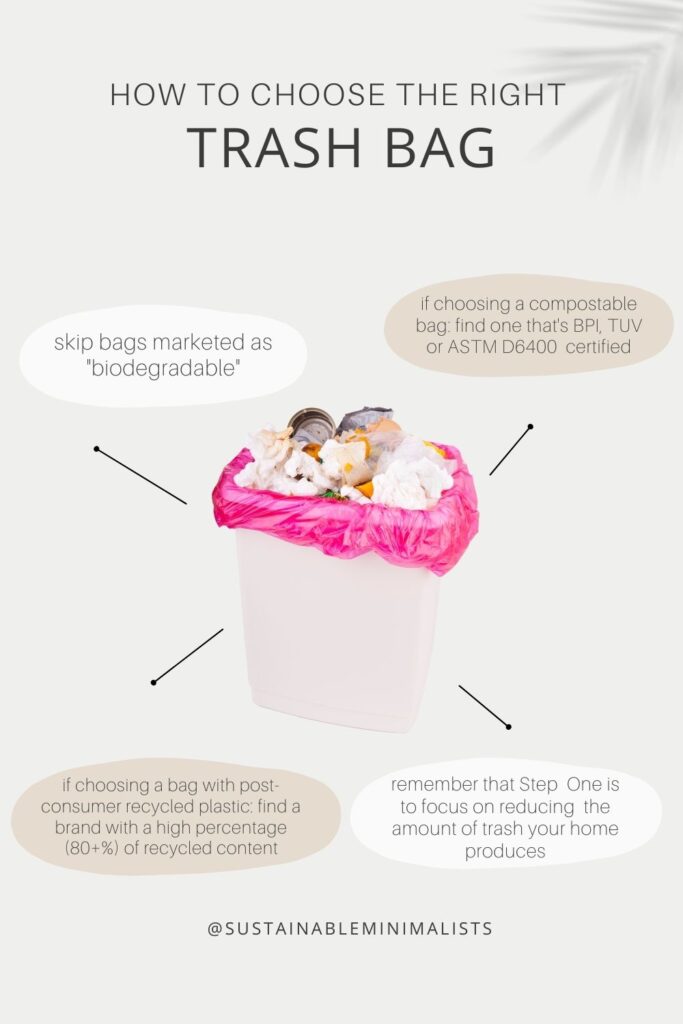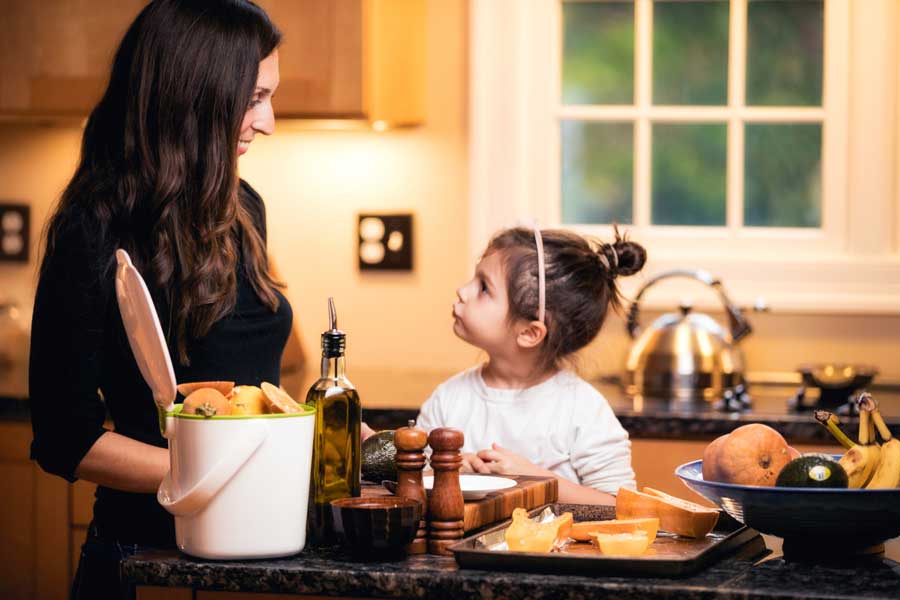Eco-Friendly Trash Bags: 5 Things You Need To Know
Is there such a thing as an eco-friendly trash bag?
When it comes to trash bags, there’s plenty of confusing verbiage. Compostable? Biodegradable? Bags with post-consumer recycled content? While one could certainly make the argument that biodegradable and compostable trash bags aren’t worth the money since they’re headed to the landfill anyway (those pits aren’t vegetable gardens, after all); the more cynical amongst us could say there’s no such thing as an eco-friendly trash bag if it holds bad-for-the-planet waste.
The goal is certainly to reduce the amount of trash sent to the landfill each week, but the reality is that most of us generate waste. And while purchasing eco-friendly trash bags doesn’t give us carte blanche to throw away as much as we want, buying the right bags is a simple and accessible lifestyle switch.
The best part? There are plenty of bags on the market that are strong, easy to use, and eco-friendly (no spillage to see here!).
Read on for 5 things to consider when buying your next set of trash bags.
[Note: While this post is sponsored, all opinions are my own.]
1. Eco-friendly trash bags are often compostable.
Whereas bags made from plastic require fossil fuels extraction and contribute to our collective microplastics problem, eco-friendly ones generally create fewer greenhouse gases and toxic chemicals. The best ones won’t create microplastics, either.
If you’re looking for a trash bag made from plant-based bioplastics instead of plastics made from fossil fuels, look for ones that are compostable.
‘Compostable’ is a well-regulated term that means something will break down without safety or environmental concerns within a defined period of time and become an element of usable compost.
It’s important to note that compostable bags won’t compost appropriately in a landfill. Landfills are airtight by design: no sunlight and no oxygen means no composting. And because bioplastics are often made from plant materials like corn and soy they suffer from the same problems as any mass-grown crop including diminished biodiversity, soil degradation, and polluted surrounding waterways.
Compostable trash bags aren’t perfect, but they’re close. They’re the gold standard for holding compostable waste: if you send your compost to an industrial facility you can place your compost in a compostable bag (just make sure the bag says its compostable in an industrial facility first).
And if you’re a home composter, place your scraps in a bag that’s designated as home compostable to keep your bin clean and smell-free.
I use HoldOn compostable bags in my own household. They’re especially great for:
Household trash. HoldOn compostable trash bags are ridiculously strong. I’m militant about sending as few bags of trash to the landfill each week as possible (I try to put 2 week’s worth of trash in one bag!), so I stuff them to the brim. HoldOn bags are strong enough to be jam packed with heavy trash and I’m happy to report I’ve never had a spillage incident.
Yard cleanups. I use HoldOn bags when cleaning up my yard because they’re home compostable. I simply place compostable yard items in the bag, then I compost the bag and its contents with very little effort. Easy peasy!
Storage. HoldOn’s bags are great for storing non-trash items, too. Stuffed animals? Old clothes? Items to donate? Yes, yes, and yes. When I’m done with the bag, I simply compost it. No waste to see here!
Powered by RedCircle
2. Choose a compostable bag with a reputable third party certification.
If you’re on board with buying compostable bags, be sure they’re actually compostable by looking for ones with a 3rd party certification.
You’ll want to purchase from a company that proudly holds one of the following three certifications to attest that the bags will compost as they should:
- ASTM D6400 certified
- BPI certified (the American equivalent of ASTM D6400)
- TUV certified (the UK equivalent)
HoldOn’s trash bags are BPI and TUV certified. As a home composter this matters to me.
3. Avoid products that are ‘biodegradable’.
In order for an item to be correctly labeled as biodegradable, it must completely break down and return to nature within a reasonably short period of time. Sounds great, right?
Not quite.
There are plenty of problems with ‘biodegradable’ verbiage. The term is grossly overused; it’s also unregulated. ‘Biodegradable’ is in many cases synonymous with greenwashing and the State of California outlawed the use of the terms “biodegradable,” “degradable,” or “decomposable” because of such rampant greenwashing.
Save yourself the headache and avoid trash bags marketed as biodegradable.
Remember:
The term “compostable” is regulated; “biodegradable” is not.
4. If buying bags made from recycled plastic, make sure the bag boasts a high percentage of post-consumer recycled plastic.
Eco-friendly trash bags may indeed be made from post-consumer recycled plastic.
Such bags require fewer virgin resources and your purchase invests in systems that efficiently remove plastic from waste streams.
But there’s still the microplastics problem; there’s the potential toxicity issue, too. If you’re vehemently opposed to plastic products for issues related to human health, recycled plastic trash bags aren’t for you.
But if you’re interested in eco-friendly trash bags made from recycled content, be sure to consider the percentage of materials that are actually recycled before purchasing. In many cases, only a portion of the bag uses recycled materials. One brand may use significantly more recycled plastic (90%) than another (50%).
It’s also important to dig deep into the brand before buying. Has the manufacturer taken other steps to reduce their environmental impact? Is sustainability a forethought that’s embedded in the company’s mission, or is it simply an afterthought?
5. Above all else, skip the traditional plastic bag.
Most conventional trash bags are made from 100% low-density polyethylene (LDPE) which is manufactured using non-renewable fossil fuels. Fossil fuels are pulled from the earth (and emit greenhouse gases in the process) to create bags we use for garbage collection.
Don’t forget the microplastics problem: Plastic trash bags break down into tiny pieces of plastic which contaminate oceans, harm marine animals, and enter our food supply.
We can do better! Remember: eco-friendly trash bags are compostable OR made from majority post-consumer recycled content.
The final word
The right trash bag isn’t the solution to our collective overconsumption; it the solution to our collective wastefulness, either. Only once we reduce the amount of garbage we produce should we then consider purchasing eco-friendly trash bags for the little waste that’s left.
Learn more about how HoldOn compostable trash bags checks all these boxes and more!
(Even better? Use code SUSTAINABLE at checkout for 15% off!)


